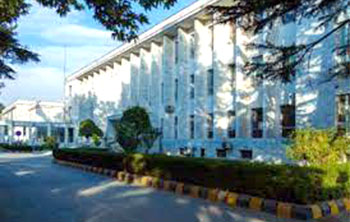The Ministry of Foreign Affairs (MoFA) issued a statement rejecting a report by the UN Security Council alleging that Al-Qaida and the Islamic Emirate have a “close” relationship and that foreign groups are in Afghanistan.
“The Islamic Emirate of Afghanistan again reaffirms its commitments and reassures all that none shall be allowed to use the territory of Afghanistan against others,” the statement said.
The UN Security Council Analytical Support and Sanctions Monitoring Team in the report said Al-Qaida has a “safe haven under the Taliban and increased freedom of action.”
“The relationship between the Taliban and Al-Qaida remains close, with the latter celebrating the former’s success and renewing its pledge of allegiance to [Mawlawi Hibatullah Akhundzada],” the UN report said.
The Ministry of Foreign Affairs (MoFA) in a recent statement said the allegations were baseless: “The fact remains that since the return to power of the Islamic Emirate, the world and the region have been prevented from facing any harm from Afghanistan, and the Afghan government has consistently worked for the last nine months to build an environment of trust with the regional and world countries.”
The Ministry of Foreign Affairs’ statement called on the United Nations to hand over the post of Afghanistan’s permanent representative at the UN to the current Afghan government in order to directly provide factual information to the UNSC and other countries.
The United Nations report estimated an approximate presence of “180 to 400 fighters affiliated with Al-Qaeda” from “Bangladesh, India, Myanmar and Pakistan” who are settled in “Ghazni, Helmand, Kandahar, Nimruz, Paktika and Zabul provinces.”
“The Islamic Emirate is committed to its promises. It has attempted for the past nine months to prevent any kind of threat to other countries from Afghan soil and to create a trust-building environment with regional countries,” said Inamullah Samangani, deputy spokesman for the Islamic Emirate.
The Islamic Emirate on Monday rejected a report by the United Nations Security Council Monitoring Team which said that following the political change in Afghanistan, foreign insurgent groups enjoy greater freedom in the country.
“There are no recent signs that the Taliban has taken steps to limit the activities of foreign terrorist fighters in the country. On the contrary, terrorist groups enjoy greater freedom there than at any time in recent history. However, Member States have not reported significant new movements of foreign terrorist fighters to Afghanistan,” the report reads.
The report questioned the Islamic Emirate’s commitment under the Doha Agreement to preventing “international terrorist” threats from having a foothold in Afghanistan. The UNSC Monitoring Team expressed concerns that foreign groups might find safe haven in Afghanistan.
According to the report, Osama Bin Laden’s son visited Afghanistan late last year. “One Member State reported that Bin Laden’s son, Abdallah, visited Afghanistan in October for meetings with the Taliban.”
Reacting to the report, the Islamic Emirate said the report lacks evidence. “The Islamic Emirate of Afghanistan strongly rejects recent report by the UNSC Monitoring Team asserting an increase of foreign groups in Afghanistan. The Islamic Emirate deems such reports lacking evidence, documents and addresses neither in the interest of Afghanistan, the region or the world,” the Islamic Emirate’s Foreign Ministry said in a statement.
The statement said the Islamic Emirate has implemented its commitments laid out in the Doha Agreement and does not allow anyone to threaten any country from Afghanistan’s territory. The statement said the Islamic Emirate will play a positive role toward security in Afghanistan, the region and the world.
“The UNSC Monitoring Team’s reports which says foreign group’s presence and activities have increased in Afghanistan, is untrue,” Hafiz Zia Ahmad Takal, deputy spokesman of the foreign ministry said.
According to the UNSC report, Amin Muhammad ul-Haq Saam Khan, who coordinated security for Osama Bin Laden, returned to his home in Afghanistan in late August last year.
Regarding the report’s allegations, “no visit and no meeting between anyone happened,” said Islamic Emirate’s Deputy Spokesman Bilal Karimi.
“The economic and political instability in Afghanistan will pave the way for activities of terrorist groups inside and outside of Afghanistan,” said Hikmatullah, a political analyst.
“Serious revisions should be made to such reports. Allegations that can shock the people of Afghanistan and world should be prevented,” said Abdul Ghafar, a political analyst.
The report warns that Afghanistan has the potential of becoming a safe haven for al-Qaida and a number of ‘terror groups’ with ties to the Central Asia region and beyond.—Tolonews










